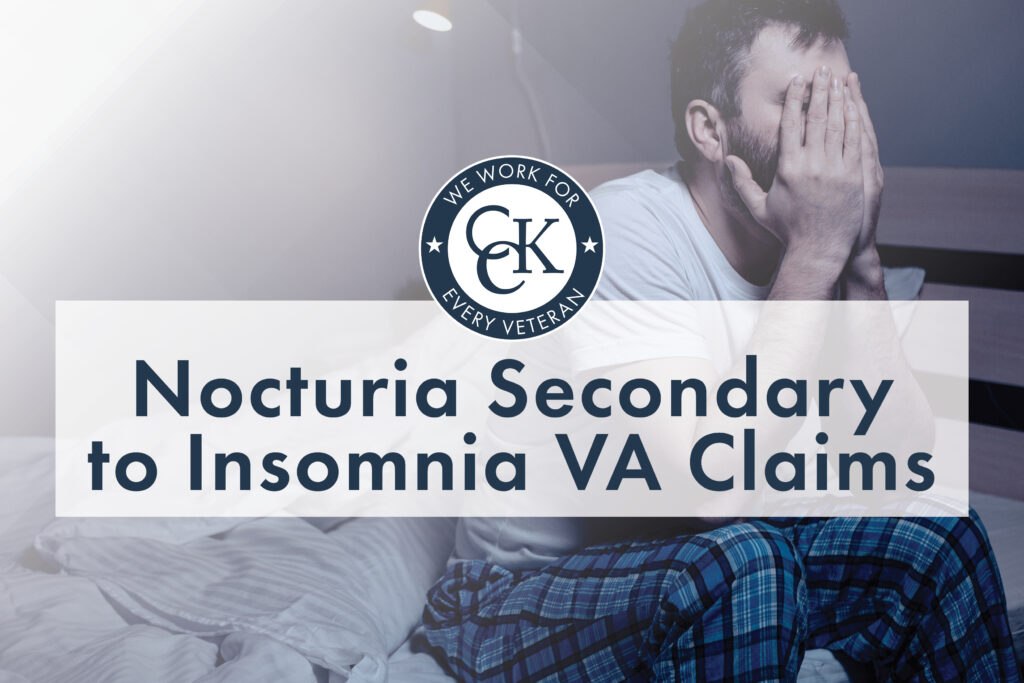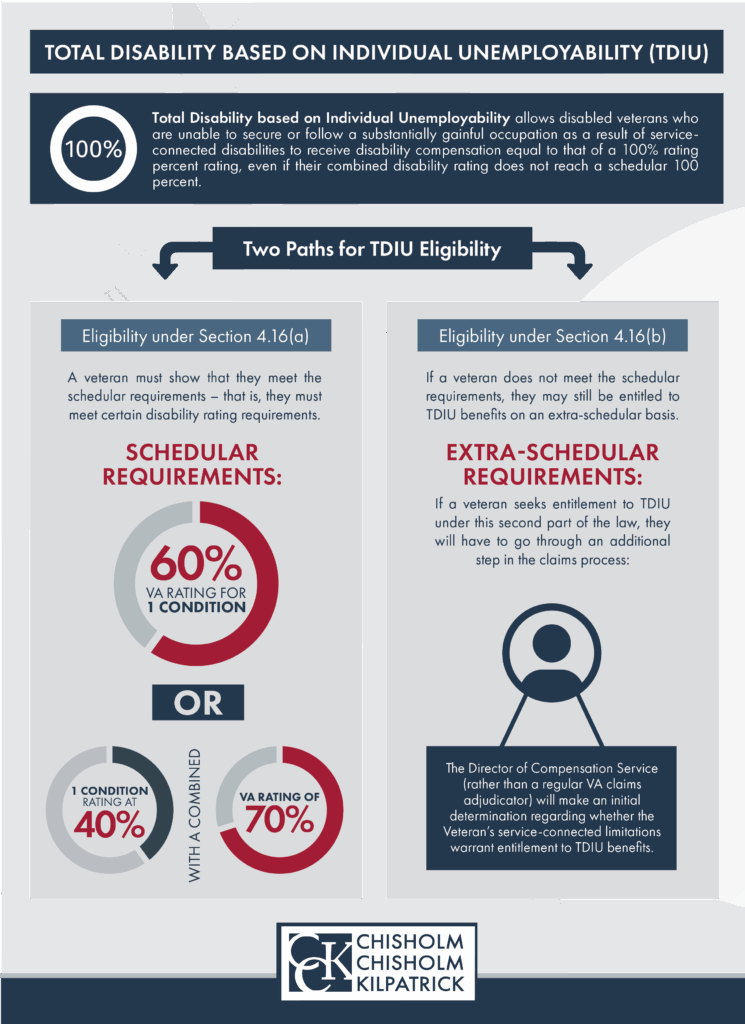Nocturia Secondary to Insomnia VA Claims

CCK Law: Our Vital Role in Veterans Law
Insomnia can cause many frustrating symptoms for military veterans, including the inability to fall asleep and stay asleep, daytime fatigue, poor concentration, mood changes, and more. But one of the more surprising symptoms of insomnia can be nocturia, a condition that causes you to wake up multiple times during the night to urinate.
Severe nocturia can be devastating to a veteran’s sleep patterns and mental health and affect all aspects of daily life. However, if you can successfully argue that your nocturia is related to your service-connected insomnia, then you could be entitled to significant financial benefits from the Department of Veterans Affairs (VA).
This article will cover how to claim VA disability for nocturia caused by insomnia. Highlights include:
- The connections between insomnia and nocturia
- How VA rates nocturia
- How to take action if you disagree with VA’s rating of your condition
- And more
What Is Nocturia?
Nocturia, or nocturnal urinary frequency, is a condition that causes patients to wake up more than once during the night to urinate. While it typically affects older people, it can be present across almost any age range.
Symptoms of nocturia include:
- Waking up several times per night to empty the bladder
- A feeling of pressure in the bladder
- Producing a greater volume of urine than usual
- Sleep deprivation
- Daytime fatigue or sleepiness
- Trouble with memory or concentration
How Does Insomnia Cause Nocturia in Veterans?
Nocturia and insomnia can be related in several ways, each one contributing to the other and leading to cycles of urinary urgency and sleep interruption. Specific ways that insomnia may induce nocturia include:
- Reduced production of antidiuretic hormones (ADH): Antidiuretic hormones, or ADH, are chemicals the body produces during the night to reduce urinary frequency. Sleep deprivation from insomnia can limit the production of ADH, leading to an increased need to urinate at night.
- Frequent awakenings in the night: Insomnia often causes veterans to awaken multiple times during the night. The more times a veteran awakens, the more likely they are to decide to urinate.
- Feelings of bladder fullness: If a veteran is awakened in the night, they often perceive their bladder to be fuller than it is, prompting them to use the bathroom.
- Trouble falling back asleep: The longer it takes for a veteran to fall back to sleep after awakening, the higher the chances of them deciding they need to urinate before they can rest.

If a veteran suspects that their nocturia may be caused by their service-connected insomnia, then the next step to gaining benefits is to establish a secondary service connection for nocturia. A secondary service connection is when a veteran can prove that a condition was caused by a separate service-connected condition.
For instance, say VA has determined that your insomnia diagnosis is connected to an incident that occurred during your military service, and assigned you a VA rating for insomnia. To establish secondary service connection for nocturia, you would have to prove that your nocturia is a direct result of this already service-connected insomnia.
If you can do that, VA may recognize that one of your disorders has caused another to develop and will thereby assign you a rating for both, depending on symptom severity.
To prove secondary service connection, you typically need two things:
- A current nocturia diagnosis from a medical professional
- Medical evidence linking your nocturia to your insomnia
For example, sleep deprivation caused by insomnia can lead to lower ADH levels in the body, which in turn prompts more frequent nightly urination. If your doctor writes a medical opinion establishing such a link between your insomnia and nocturia, you may have sufficient evidence for a nocturia secondary to insomnia VA claim.
Compensation & Pension Exams for Nocturia Secondary to Insomnia
A Compensation and Pension (C&P) exam is a medical evaluation carried out by a VA healthcare provider or contractor authorized by VA. These exams play a key role in helping VA decide whether a veteran’s condition is related to their military service—directly or not—and in gathering information to determine a disability rating if that connection is established.
During an appointment for nocturia secondary to insomnia, the VA examiner may conduct a physical assessment or request a sleep study. They might go on to inquire about a veteran’s sleep habits, urinary frequency, and service history. They may also ask about how a veteran’s nocturia affects their sleep, daily routines, and overall quality of life.
It’s essential to be truthful and detailed when discussing your symptoms. Clearly explain how often you experience urinary issues each night and describe how these symptoms disrupt your sleep or daytime cognition.
Can Veterans Receive a Nocturia VA Rating?
Nocturia does not have a diagnostic code of its own assigned by VA. Instead, it is rated under the Urinary Frequency schedule of 38 CFR § 4.115a, Ratings of the Genitourinary System – Dysfunctions.
As Urinary Frequency, VA may rate your nocturia at 10, 20, or 40 percent disabling, depending on severity and frequency. The rating criteria are:
- 40 percent – Daytime voiding interval less than one hour, or awakening to void five or more times per night
- 20 percent – Daytime voiding interval between one and two hours, or awakening to void three to four times per night
- 10 percent – Daytime voiding interval between two and three hours, or awakening to void two times per night

Combined Disability Ratings and “VA Math”
It is important to note that the rating percentages above apply only to nocturia. If a veteran is indeed suffering from insomnia that then goes on to cause nocturia, VA will each of those conditions separately, then combine all a veteran’s ratings using a complex process called “VA math.” This final combined VA disability rating percentage is what determines the actual amount of monthly compensation the veteran receives.
For more information on VA math and how VA determines a veteran’s rating if they have multiple service-connected conditions, try out CCK Law’s 2025 VA Disability Calculator. This calculator will automatically estimate your potential total rating, based on your symptoms.
VA Compensation for Nocturia Secondary to Insomnia
Depending on the rating percentage you receive from VA for your combined conditions, you will be entitled to monthly compensation equal to the 10, 20, or 40 percent criteria on the table below.
As of 2026, the VA disability rate benefit amounts are as follows:
- 10 percent disability rating: $180.42 per month
- 20 percent disability rating: $356.66 per month
- 40 percent disability rating: $795.84 per month
TDIU and Nocturia Secondary to Insomnia
If you have nocturia secondary to insomnia, you know that frequent urination is not the worst of the symptoms. Sleep deprivation, trouble thinking, memory issues, and chronic fatigue are all debilitating side effects and can severely impact a veteran’s ability to support themselves financially.
A veteran whose service-connected disabilities stop them from obtaining or keeping gainful employment may be eligible for Total Disability based on Individual Unemployability (TDIU). This benefit enables veterans who aren’t rated at a full 100 percent to still receive compensation at the maximum monthly disability rate.

There are two primary routes to qualify for TDIU:
- Schedular TDIU – To qualify under this path, a veteran must either:
- Have one service-connected condition rated at 60 percent or higher, or
- Have a combined disability rating of at least 70 percent, with one of those conditions rated at 40 percent or more.
- Extraschedular TDIU – Veterans who don’t meet the standard percentage thresholds may still be considered on an extraschedular basis. This requires the Director of Compensation Services to intervene in the claim if they determine a veteran’s symptoms limit their ability to work.
Given the complexities involved in TDIU claims and the evidence required to support them, it is often beneficial to seek help from a VA-accredited representative, such as a qualified attorney or claims agent, to improve your chances of earning your benefits.
Disagree with a VA Decision About Your Nocturia Secondary to Insomnia Claim? Call CCK Law
Do you disagree with a denial or rating that VA gave you for your nocturia secondary to insomnia claim? Consider seeking the help of a VA-accredited law firm to appeal VA’s decision. CCK Law has the most combined experience of any veterans law firm. We not only help you resolve issues with your claim or challenge VA’s errors, but we also assist in identifying other overlooked or complex benefits, such as secondary conditions, TDIU, and Special Monthly Compensation.
Call CCK Law today at (800) 544-9144 or contact us online for a free case evaluation.
About the Author
Share this Post
